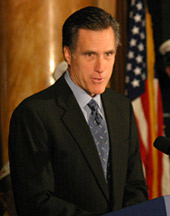Poll: Insiders favor Clinton, Romney in 2008 : Party officials' opinions about presidential candidates often shape the race. Deep partisan divisions r
By Mark Z. Barabak
Times Staff Writer
Published March 4, 2007
Democrat Hillary Rodham Clinton and Republican Mitt Romney have emerged as the leading presidential favorites among party insiders, according to a new Los Angeles Times poll, which found deep partisan divisions over the country's direction and top issues in the 2008 campaign.
The survey showed former Sen. John Edwards of North Carolina in second place among Democratic Party leaders, ahead of Sen. Barack Obama of Illinois. It pointed up danger signs for Sen. John McCain of Arizona, who trailed former Massachusetts Gov. Romney and former New York City Mayor Rudolph W. Giuliani, the leader among Republicans in national voter surveys.
It also signaled GOP concerns about holding the White House for an additional four years — 42% of party leaders said it would be tougher to elect a Republican after eight years under President Bush, and just more than half said the GOP nominee should campaign on moving the country in a new direction.
"I love President Bush — I really do," Cindy S. Phillips, a Republican national committeewoman from Mississippi who is looking hard at Giuliani, said in a follow-up interview. "But you can't be the same as the person before you. You have to bring your own touch, your own ideas."
The poll surveyed members of the Democratic and Republican national committees, the governing bodies of the two major political parties. Though relatively few, these insiders could have an important role in deciding which of their candidates face each other in November 2008, thanks to the influence many wield in their states.
"The DNC and RNC members are not just delegates" to the national nominating conventions, said Charles Cook, a nonpartisan campaign analyst in Washington. "They are key organizers and opinion leaders. They can help build or kill a groundswell, make a candidate's challenge in a state easier or much harder. They matter a lot."
The poll also offers a different reading of sentiments than national voter surveys, which tend to be heavily influenced by name recognition at this early stage of the campaign.
A similar poll of DNC members about four years ago found significant backing for Sen. John F. Kerry of Massachusetts as well as surprising support for Edwards and former Vermont Gov. Howard Dean — at a time when the latter two made comparatively weak showings in voter surveys. The three ended up as the top contenders for the Democratic nomination, won by Kerry.
The Times Poll, directed by Susan Pinkus, interviewed 313 of 386 DNC members and 133 of 165 RNC members from Feb. 13-26. Since the poll attempted to interview current state members of each organization rather than a random sample, there is no margin of error.
The survey found no candidate enjoying a lock on institutional support. To the contrary, more than 1 in 3 RNC members had no favorite; just under 1 in 3 DNC members had no preference.
Among Republicans, Romney had the most backing among party insiders, with 20% support, followed by Giuliani with 14%, McCain with 10% and former House Speaker Newt Gingrich of Georgia — who has said he might enter the race in the fall — with 8%.
In a potentially worrisome sign for McCain, just over 1 in 10 RNC members said they would not support him if he won the party's nomination in his second attempt.
"It shows just how much resistance there is within the Republican establishment to McCain and how open the party is to candidates who either aren't very conservative, like Giuliani, or only recently minted conservatives, like Romney," Cook said. "McCain has worked pretty hard since 2000 to be a team player, but these numbers would suggest that there is still a problem for him."
Among Democrats, Sen. Clinton of New York had the backing of 20% of party leaders, followed by Edwards with 15%, Obama with 11%, former Vice President Al Gore — who is not in the race — with 10%, and New Mexico Gov. Bill Richardson with 9%.
Regardless of whom the insiders supported, Giuliani and Clinton were each rated their party's strongest prospective nominee with the best shot at winning the White House.
The insiders were divided over their most important criterion for backing a candidate. Just over a third of Republicans said issues were the most important factor. Nearly 4 in 10 Democrats said the most important factor was a candidate's chance of winning the White House.
The survey turned up a dramatic split over the direction of the country and the problems the presidential candidates should address.
Whereas 83% of Republicans said the country was on the right track — and all said the economy was doing well — 95% of Democrats said the country was headed the wrong way, and more than 6 in 10 said the economy was in bad shape.
Not surprisingly, partisans were also worlds apart over the war in Iraq, with the overwhelming majority of Republicans supporting Bush's policies and Democrats nearly unanimous in their opposition.
There was less agreement among Democrats over an exit strategy. Just over half of DNC members favored legislation requiring Bush to begin withdrawing U.S. troops; 17% favored the more dramatic step of cutting off funding. About 2 in 10 Democrats said Bush should not be required to withdraw troops.




No comments:
Post a Comment